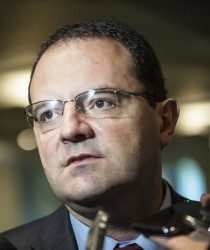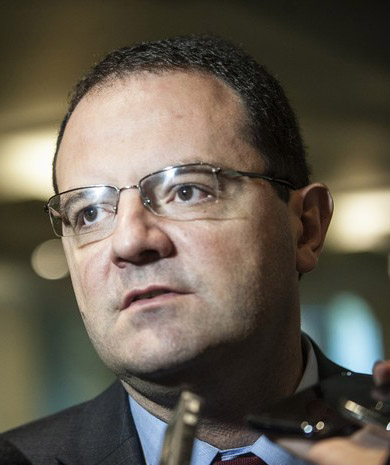BRASILIA, (Reuters) – Brazilian President Dilma Rousseff named leftist economist and close aide Nelson Barbosa to replace fiscally conservative Finance Minister Joaquim Levy yesterday, signaling a dramatic break with the deficit-cutting policies her administration has pursued for most of this year.

Barbosa, who was the planning minister, has been one of the strongest opponents of an aggressive austerity drive that Levy led in an attempt to regain the confidence of investors in an economy mired in its worst recession in a quarter of a century. Levy’s exit had been expected after Fitch this week became the second ratings agency to strip Latin America’s largest economy of its coveted investment grade.
Faced with the threat of impeachment by her opponents, Rousseff has watered down Levy’s push for austerity, the latest sign that she could abandon market-friendly policies to gain support from her leftist allies in Congress.
Levy, who had been in his post for nearly a year, clashed repeatedly with Rousseff over budget cuts that he sought to improve the country’s fiscal health.
In his first comments to the press, however, Barbosa said the government was committed to shoring up the country’s finances with new fiscal savings measures.
“The focus of economic policy continues to be fiscal stability, which is what we need for the economy to recover,” Barbosa said. “Our commitment to fiscal stability remains the same.”
Barbosa is considered a leftist economist in much the same vein as Rousseff and his appointment will be interpreted as a return of the policies blamed by critics for sinking Brazil’s economy into recession this year.
“Markets will react negatively because of the good reputation of the departing minister,” said Alberto Ramos, a senior economist with Goldman Sachs in New York. “And also out of fear that Levy’s replacement will signal a shift back to fiscal populism.”
Before the announcement, speculation that Levy was leaving weakened the real more than 1 percent and pushed down the benchmark Bovespa stock index 3 percent to end the day at its lowest since April of 2009. The real futures showed the currency weakened another 1.0 percent after the confirmation that Barbosa was taking over the ministry. Moody’s Investor Services said in statement that Levy’s exit could hinder efforts to improve Brazil’s public finances. Moody’s, the only of the three major rating agencies keeping Brazil on investment grade, has warned it could downgrade the country to junk in coming months.
Barbosa, a former finance ministry official during Rousseff’s first term, has pushed for more flexible budget targets, although he has reiterated Brazil should take measures to stabilize its growing public debt.
The Fitch downgrade this week, though widely expected, reflected the sharp reversal in Brazil’s economic fortunes.
The departure of Levy, who has held the post since January, could hinder the approval of several measures such as the revival of a controversial financial transaction tax, known as CPMF, aimed at heading off a full-blown fiscal crisis that has scared investors.
Barbosa is closely associated with the same school of thought that Rousseff subscribes to, which is known in Brazil as developmentalism and which defends high government spending and intervention to protect industries from foreign competition. A graduate of The New School for Social Research, a U.S.-based college known for its leftist economics teachings, Barbosa was one of the main economic advisers to Rousseff and the architect of her successful low-cost housing program, called “Minha Casa Minha Vida” (My House, My Life). Rousseff has been in office since 2011.
In a year-end breakfast with reporters earlier yesterday, Levy criticized the government lack of clarity in economic policy and urged policymakers to seek deeper reforms.
“We need clarity from the government to remove uncertainties and return to growth,” Levy said. “The downgrade was a warning call and we have the capacity to change our path.”

